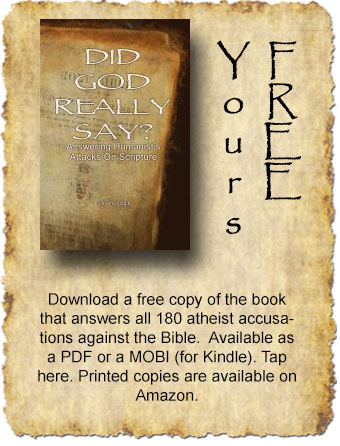Atheist's Attacks
Answering Humanist's Accusations Against the Bible


Science Is Not Superior to the Bible
Does the Bible teach that the sky is a solid dome?
THE HUMANIST'S CLAIM the Bible teaches the: Sky is a Solid Dome Containing Windows
The Bible promotes the idea that the sky is a solid dome covering the earth. In the creation account given in the first chapter of Genesis, verse 17 says the Lord set the sun and moon “in the firmament” to provide light for the earth. The Hebrew word translated as firmament is raqia, which means “hammered metal.”[37]

More support for the notion of a domed earth is found at Job 37:18 (where the sky is described as like a “molten lookingglass”); Isaiah 40:22 (God “stretcheth out the heavens as a curtain, and spreadeth them out as a tent to dwell in”); and Revelation 6:14 (“And the heaven departed as a scroll when it is rolled together.”).
[37] Ecker, Ronald L., Dictionary of Science and Creationism (Buffalo: Prometheus Books, 1990), p. 56.
This is an interesting one. At one time, some Bible scholars thought there was a clear ice canopy around the earth prior to Noah's flood. Others disagreed. As this hypothesis was studied, no support was found in scripture, nor in science, for an ice canopy. As is true throughout all science, hypotheses are proposed; they are studied; and either accepted or rejected . The ice canopy hypothesis has been rejected. However, I do not think the humanists are talking about a pre-Noahic ice canopy.
The humanist's assertion that the Bible teaches the sky is presently a solid dome is false. Notice in their assertion they use the word "is," asserting that the Bible teaches there IS now a solid dome around the earth. That is a false assertion even for those who once believed there was an ice canopy over the earth prior to Noah's flood.
This really has me wondering about humanists. They, or at least the humanist who wrote this article, seems to have no interest in truth. As long as he can assert something that apparently attacks the Bible, that's good enough. Truth or fiction, it makes no difference, as long as it attacks the Bible. There is no interest in understanding the context, nor what the Bible actually says, nor in investigating and learning the facts. Maybe that is because they have no real facts nor logical, rational thinking supporting their position. All they have is the human self-centered desire to have our own way. We humans want to be in charge. We want to make the rules and not be accountable to anyone... especially an all-knowing God. Unfortunately for humanists (and atheists and agnostics), human desires do not change reality. God is real. They, and everyone else, needs to deal with the reality of a perfect God, and what will happen when they stand before God to be judged.
Genesis 1:17 - Getting Hebrew Words Right
I am learning not to trust anything the humanists say. That means we need to start by being sure the key word in their assertion about Genesis 1:17 is correctly defined, the Hebrew word translated as "firmament" in the King James. A good way to do this is by checking recent translations. For example, in the NASB we see the word "expanse" used instead of "firmament." Why is that?
A concordance is used to identify the words of the original language. The original Hebrew word used here is "raqiya," which is Strong's 7549. It appears nine times in Genesis 1:1-20. The Strong's Concordance definition is "that which is fixed and steadfast, rather than that which is solid." (Strong's KJV, 2001) Strong's further refines the definition: "The firmament is that which is spread out or stretched out, an expanse. Thus it is extended and fixed, or a fixed space."
Did you notice a problem? The Hebrew word identified by Strong’s (raqiya) is different from the one referenced by the humanist (raqia). The spelling is close, but they are different words. If you are not familiar with Strong’s, it is the standard reference to the words used in the Bible. There are more detailed dictionaries, but Strong’s is scholastically sound, and easy for layman to use.
The humanists use Ronald Ecker, an anti-Christian author, who is referenced as identifying the Hebrew word used here as "raqia." That word is Strong's 7554. It means "spread out." While it is the root of the Hebrew word of "raqiya," it is not the word used in Genesis.
Defining Raqiya
There is a reliable source for a definition of "raqiya." The Bible itself. God defines “raqiva” in Genesis 1:8:
And God called the firmament [raqiya] Heaven [shamayim]. So the definition is heaven, the Hebrew word "shamayim." Keep in mind that the Bible refers to three heavens. The atmosphere of the earth, where birds fly and clouds float (the sky). Outer space where the sun, moon and stars are located. And the abode of God. The context tells us which "heaven" scripture is talking about in any specific verse. For our discussion, it is obvious from God's definition that "firmament" cannot refer to a canopy over the earth... metal, ice, or any other material.
“When the Bible is read in a straightforward logical way, a very clear understanding of the firmament emerges. From the biblical writers’ perspective, it was not a barrier between heaven and earth. It was rather, heaven itself. “God called the firmament, heaven.” (Gen. 1:8) When we allow the Bible to define its own terms, the mystery of the firmament disappears. No need for sophisticated arguments from etymology or ancient cosmologies. The firmament is the heavens, and the heavens are a vast open expanse that contained the clouds and luminaries.” – From: “Does Genesis teach solid-dome cosmology?” - Talk Genesis, May 26, 2016.
Another good article is: The Collapse of the Canopy Model, by Bodie Hodge (September 25, 2009).
Understanding Job 37:18
The next verse the humanist references is Job 37:18. The Talk Genesis page quoted above also has good information on this verse. First, however, a basic principle of Bible interpretation: scripture accurately reports what people said. However, that does not mean that what they said is true. In this case, the referenced verse is part of a statement by Job’s friend Elihu. While the Bible is infallible in recording what Elihu said, what Elihu said is not necessarily correct. In addition, the purpose of Elihu's speech is to declare God’s justice, exalt God, and condemn Job’s attitude toward God. He is not making a scientific statement. We need to be careful about how we understand statements such as this.
Looking specifically at what Elihu is saying, from the context is appears he is talking about the clouds. The book of Job was written soon after the flood, perhaps during the ice age. Elihu describes the cloudy skies as a ‘cast mirror’ likely as a metaphor. Mirrors, at that time, were probably a bit cloudy and the logical connection is not hard to see. .—Paraphrase from: “Does Genesis Teach Solid-Dome Cosmology?” Talk Genesis, May 26, 2016
Let's Look At Isaiah 40:22
It is He who sits above the circle of the earth,
And its inhabitants are like grasshoppers,
Who stretches out the heavens like a curtain
And spreads them out like a tent to dwell in.- Isaiah 40:22 -
I cannot make the connection to a domed earth from this. It is describing exactly what we see. The earth appears like a circle, just as this verse says. When you look at a ball from a distance, it looks like a circle. For example, when looking at the earth from the vantage point of the moon, the earth looks like a circle.
And the universe is expanding... spreading out... just like this verse says. Therefore, the second part of the verse, written 600 years before Christ, accurately describes something no one at that time could have known through human knowledge.
Is it the analogy to a tent that leads humanists to think this verse is talking about a canopy? That makes no sense. The analogy is to stretching out a tent, which at that time was done in preparation to setting it up. We are talking about a large tent made from animal skins, not the small, lightweight, nylon tents we have today. These tents had to first be stretched out, before they could be set up.
Finally Revelation 6:14
12 - I looked when He broke the sixth seal, and there was a great earthquake; and the sun became black as sackcloth made of hair, and the whole moon became like blood;
13 -and the stars of the sky fell to the earth, as a fig tree casts its unripe figs when shaken by a great wind.
14 -The sky was split apart like a scroll when it is rolled up, and every mountain and island were moved out of their places.
The context of Revelation 6:14 is that of a prophecy about the destruction coming on the earth. The events in Revelation 6 take place during the Seven Year Tribulation that happens just before Christ returns. Everything, the entire universe, is literally falling apart... including the sky. This verse does not imply the "sky" is a canopy and that canopy is coming apart. The prophecy is that the physical disaster that happens will be so great, that it will appear that even the sky is splitting. The universal destruction will be so great and so terrifying, and so obviously coming from God, that...
5 - The kings of the earth and the great men and the commanders and the rich and the strong and every slave and free man hid themselves in the caves and among the rocks of the mountains;
16 - and they *said to the mountains and to the rocks, “Fall on us and hide us from the presence of Him who sits on the throne, and from the wrath of the Lamb;
17 - for the great day of their wrath has come, and who is able to stand?”
Conclusion: The Bible does not describe a canopy over the earth, and certainly not a metal canopy. There was a hypothesis that there was once an ice canopy prior to Noah's flood, but that is not supported by either the Bible or science.
WHAT'S NEXT? We're not moving on. The humanist have more to say on this topic: This concept of the sky was common in the ancient Near East and taken for granted by the Bible writers. [38] Based on the Bible, most of the early church fathers accepted the notion of the firmament.[39] The same position was supported by Cosmas, and thus was part of orthodox Christian doctrine for several centuries.[40]
Orthodox doctrine also contained the related idea that the firmament has windows – which are opened by angels when God wants to send rain upon the earth. Cosmas believed that when the windows are opened, some of the waters contained above the firmament (which are mentioned at Genesis 1:17) fall to the earth. Cosmas’ basis for this belief was the statement, at Genesis 7:11-12, that at the time of the Noachian flood the “windows of heaven were opened” and the rain fell.[41]
Here are the references:
[38] Ecker, pp. 69, 70.
[39] White, Vol. I, pp. 114-115. See also Draper, pp. 62, 63.
[40] White, Vol. I, pp. 325, 326. See also Draper, p. 294.
[41] White, Vol. I, p. 325.
What strikes me right off is that there are three references to the discredited Andrew White. This should be interesting. Click here to learn the truth...
THE WIDE OR
NARROW WAY?

Most people choose the wide road. It's the way everyone else is going. It's wide and it's an easy road, so it must be the right road. But it's the wrong way!
Enter through the narrow gate; for the gate is wide and the way is broad that leads to destruction, and there are many who enter through it. For the gate is small and the way is narrow that leads to life, and there are few who find it. - Matthew 7:13
The wide road, and wide gate is our choice based what feels good. But our feelings (our heart) are deceptive.
The heart is more deceitful than all else and is desperately sick; - Jeremiah 17:9
Christianity... meaning belief in Jesus Christ... is not a blind faith driven by emotions. It is an informed faith, based on historical facts and truth.
The truth is that we are law breakers (sinners) in need of a Savior from the just wrath of God. That Savior is Jesus Christ.
Trusting Jesus is not the easy way. It is the narrow road, through a narrow gate, and it can be difficult at times. But it is the right way to go. And it is the only way to have eternal life in Christ Jesus.
Trust Jesus. Believe in the Lord Jesus, and you will be saved. - Acts 16:31
